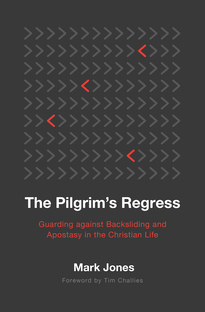
Mark Jones
Reviewed by: Charles Williams
The Pilgrim’s Regress: Guarding against Backsliding and Apostasy in the Christian Life, by Mark Jones. P&R, 2023. Paperback, 240 pages, $19.99. Reviewed by OP minister Charles Williams.
There is perhaps nothing more heartbreaking for a pastor than to witness the slow drift of a church member from the things of God. Repeatedly, the Scriptures alert us to the shepherd’s task not only of defending the sheep from wolves, but also in seeking out the sheep who wander and stray (Ezek. 34:16). The human heart, even the redeemed human heart, is still subject to the self-deceptive wiles of sin, so much so that Scripture commands vigilance above all else in keeping the heart (Prov. 4:23). Mark Jones’s latest book proves a welcome armament in this ongoing war against indwelling sin.
The Pilgrim’s Regress addresses a critical warning replete throughout both Testaments: backsliding and apostasy. Taking his cues from Scripture, Jones examines the dangers of the lukewarm heart. In one sense, this is a work of historical theology. Jones appropriates the insights of the giants of the faith throughout the ages, from the Church Fathers, including Augustine and Cyprian; to the medieval Scholastics, like Anselm and Peter Lombard; to the Reformers, as Ursinus and Calvin; to the Puritans, including Bunyan, Flavel, Owen, and Sibbes; to the great nineteenth-century heroes, such as Charles Spurgeon and Octavius Winslow; and even to the moderns, such as John Murray and Sinclair Ferguson. Yet this is not a work of bare academia; at its heart, it is eminently practical and positively pastoral.
Jones describes various actions that contribute to the “drift” (Heb. 2:1). First, he considers the very self-deceptive nature of sin that numbs and hardens the heart to the things of eternity. Jones underscores the reality that such drifting can become true, not only of bare individuals, but also of corporate entities, such as congregations or even whole denominations. He then contemplates various manifestations of sin, be it that cold, legalistic love that obeys but does not adore; the archetypal sin, pride, which exalts the self over God; or capitulating to the temptation to fear men more than God himself. And though our Good Shepherd has given us resources to combat the plague that continues to fester within—the Word, sacraments, and prayer—the backsliding heart, if left unchecked, will neglect, disregard, and ultimately abandon these tools as well.
Though those who truly belong to God will never fall away, there are those within the visible church who, though having perhaps even made a public profession, will. And in some cases, as Scripture attests, there may come a point when one drifts to the point of no return. This we call apostasy. Using John Owen as a guide, Jones navigates the warning passages found in Hebrews and elsewhere to describe the nature of apostasy, not only to warn all of the real dangers that attend unmortified sin, but also as a means to comfort weak Christians who despair over the sin against which they so desperately struggle.
The Pilgrim’s Regress is not simply descriptive, but prescriptive. Concluding every chapter are diagnostic questions designed to aid the reader in the task of self-examination and in providing the requisite antidote to the straying heart: repentance and faith. This is, in this reviewer’s opinion, a necessary component of the book, for it is here that Jones’s own pastoral heart shines forth as he seeks to rouse the reader from slumber to be killing sin before it kills the reader. Though this cannot be done apart from the Spirit’s work in our hearts, our hearts must work by the Spirit to put to death the sins of the flesh (Rom. 8:13–14). Highly recommended.
July 27, 2025
July 20, 2025
July 13, 2025
Proclaiming Christ in a Pluralistic Age
July 06, 2025
June 29, 2025
June 22, 2025
June 15, 2025
© 2025 The Orthodox Presbyterian Church